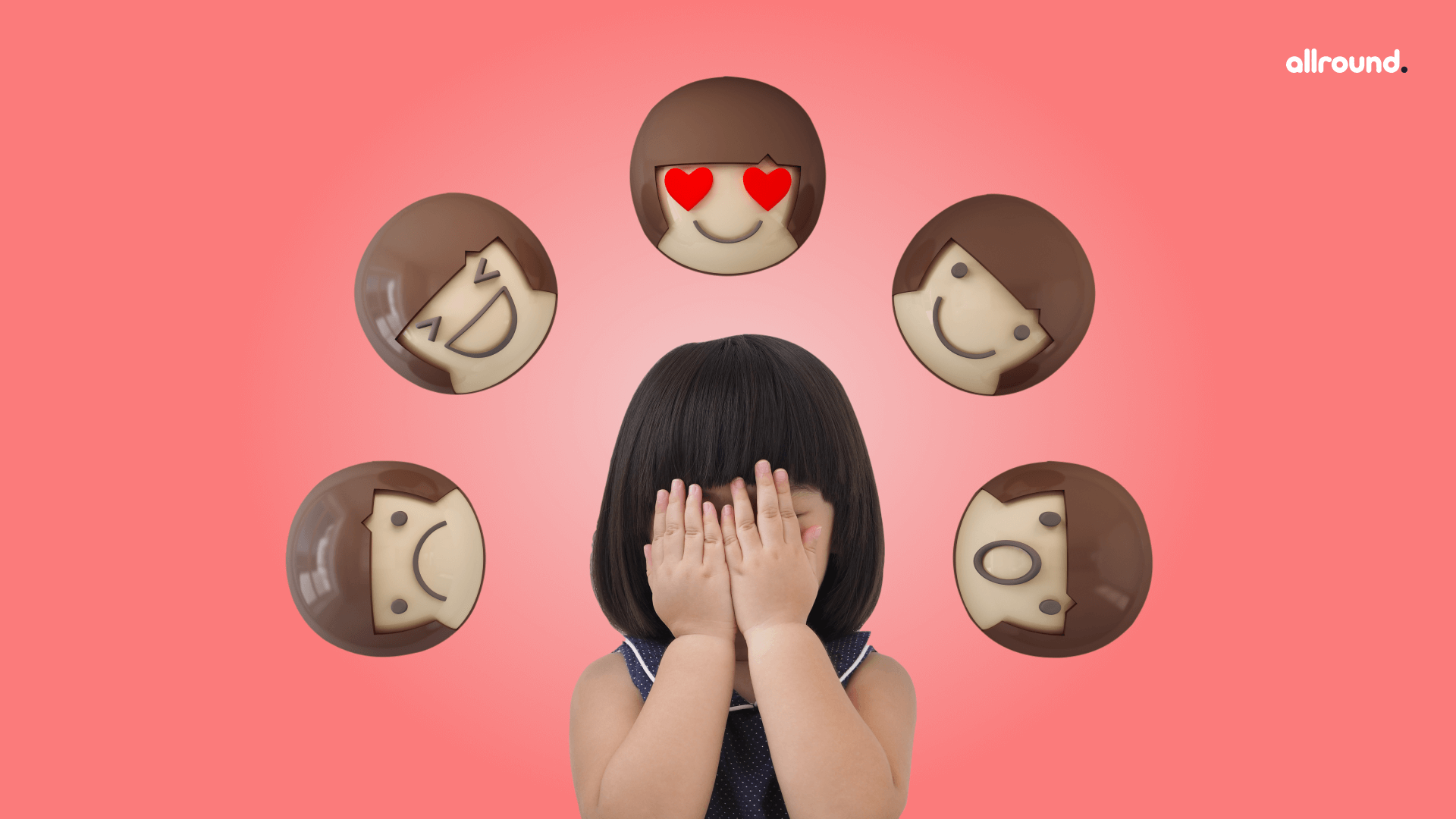How Can Kids Manage Their Emotions?8 min read
Children are considered to be mini adults, it is no surprise that they experience many of the same feelings and emotions that we do as grown ups. They not only feel happy and sad but can also experience more complex emotions like anger, frustration, nervousness, jealousy, worry, embarrassment and so much more.
Although your kids may not necessarily have the vocabulary or the skills to explain how they are feeling, they are still able to communicate their emotions in other ways. While crying is a pretty common response to dealing with overwhelming emotions of anger, stress, fear or even happiness, kids also express their feelings through their bodies, their facial expressions and their overall behavior.
However, sometimes your child may act out his feelings in ways that can be problematic and this is where you as a parent need to really pay attention and step in when needed.
Contents
When does a child start to control feelings and emotions?
Although you may be surprised to know this, but children begin to learn the emotional skills that are required to identify, express and manage their feelings from the very moment they are born! Various social interactions with parents, grandparents, guardians and care-givers help children to build on their emotional skills as they continue to grow.
At the ages of 3 and 4 children know what they like and dislike, and as their personality constantly develops each day, they are able to express themselves better with lesser meltdowns and tantrums. Even though children at this age may not necessarily be well-equipped to manage and/or control their emotions very well, they can still understand and even differentiate between major feelings.
At the age of 5, a child has usually made huge progress in his/her emotional development. Children find it easier to talk about their emotions and are also much better at regulating them by the time they reach this age.
However, not every child learns and grows at the same pace and some kids might find it difficult to practice self-regulation. This is quite a commonly seen challenge for young kids who have not yet learnt to manage and cope with their bigger emotions in constructive ways. This is where a parent plays an important role.
How do you explain emotions to your child?
As a parent it is important for you to help your kids to understand their emotions and feelings and effectively express them to you. Children need to understand various emotions from a young age and how to appropriately deal with them. Since self-regulation is a skill that can be learnt, parents play an important role in how their kids learn to regulate their own emotions.
However, instead of sitting with a super long list of emotions to define, it is always preferable if you start with the basics. Most of the emotions we know and feel actually stem from a few primary ones. Some of the most common and complex emotions that you can talk to your child about are:
- Anger
- Jealousy
- Sadness
- Fear
How can you help your child to manage their feelings?
Identifying, explaining, discussing and demonstrating different emotions are a few steps that you can adopt to help your child’s emotional development from a young age. It is crucial that you train your child to identify, name, interpret and use his emotions in healthy ways. This will assist your child to understand why he is feeling what he is feeling and to learn a new language with which he can express himself better.
Teaching your child to label his emotions will also assist him to constantly pay attention to how he is feeling and catch an emotion before it gets to overwhelming or difficult to deal with. Identifying feelings in others is another useful tactic to help your child. Asking them to assess and point out what emotions a certain character in a movie or book is feeling will help them to understand emotions better.
Watching how your kid behaves is also crucial as many behaviours stem from certain feelings. So, it is necessary that you pick up on unintentional cues that your child gives. Always strive to be a role model for your child as he will learn a lot from your behavior. It is important for parents to listen to their child’s feelings and praise them when they choose to open up and share.
Apart from these steps, we have analyzed the four common emotions that were mentioned earlier (anger, jealousy, sadness, fear) to help you understand how to help your child deal with them.
Anger
Anger is an extremely strong feeling of annoyance, displeasure and hostility. In children, it is often seen coming to the forefront when their fight-or-flight response is triggered. Although anger in itself is a healthy and normal emotion, children who don’t understand it properly might act out with aggressive actions.
It is important to separate the emotion from the behavior, and explain to your child that while he may feel anger, he is still in control of how he behaves when he is angry. Your child learns a lot just by observing you so it is necessary for parents to model healthy ways of dealing with anger. If you are gentler when you get angry, that’s what they will pick up on.
Teach your kids to communicate when they are angry and help them to verbalize why they feel that particular emotion at that time. Asking them simple questions like “How do you feel?” and “What or who is making you feel angry?” will encourage them to speak about their feelings rather than just lashing out and having a meltdown.
Jealousy
Have you ever seen a child get uncomfortable or annoyed when their parent holds another kid? That is an example of jealousy. Jealousy is an emotion that kids can feel from as little as three months old. It can be described as a combination of insecurity, inadequacy, resentment and helplessness. It can also play out when your child sees something that another kid has and feels a sense of lack.
As parents, telling your children to not be sad or to stop throwing a tantrum does more harm than good. This will make them suppress what they are feeling only for it to come out in unhealthy ways in the future. Constricting them and telling them to not show their emotions will only lead to them dealing with them negatively. Rather, acknowledge their feelings and tell them that you understand. Highlight their strengths and show them how they can be grateful for what they have. This is also a great opportunity to emphasize values and teach them the importance of being content.
Sadness
Sadness can be associated with feelings of disappointment, loss or sorrow. Your child can also feel sad when they get hurt by the actions and/or words of someone else or when they are scared. This is an emotion that parents should not leave unattended to. If your child feels sad, he/she will also think sad and act sad. Although crying is one of the most obvious signs that your child is sad, other signs of sadness can also include your child being clingy, getting angry or isolating himself/herself.
It is so important for you to be your child’s closest accomplice when they feel sad. Constantly reassuring them that you are there with and for them will help them feel safe and loved. Ask them what they need and don’t shy away from hugging or snuggling with them if needed.
Fear
It is natural for children to have certain fears like being separated from their parents, or the dark. But many a times, other fears may develop out of worry and anxiety about certain things. Seeing something scary on television, hearing a scary story, or being around someone that makes them feel uncomfortable can also cause children to get anxious and begin to fear.
It is crucial that parents validate their worries and show them that they understand. Telling children that a certain fear is irrational or trivial is not going to make that fear disappear. Explaining to your child that everyone feels scared at some point and maybe sharing a small instance from your own life might help him to open up about his fear. Sometimes verbalizing their thoughts will help children to realize that their fear was not as bad as it actually seemed in their head. Acting out or reading stories related to what they are afraid about can also help kids to overcome their fears.
How does managing emotions benefit children?
It’s never a bad thing for children to learn to manage their emotions. Learning to cope with their feelings and emotions in healthy and constructive ways will prove beneficial for them especially later on in life.
Children who learn to express and manage their emotions in a healthy manner are more likely to:
- Be more mature
- Feel more confident
- Have a positive sense of self
- Perform better academically
- Have healthier relationships
- Be empathetic
- Throw fewer tantrums
These are just a few of the many positives of teaching your child to understand and effectively deal with their emotions from a young age.
Conclusion
It is clearly so vital for children to learn how to cope with and manage their emotions. Even though it can get difficult at times, coaching your child to deal with his feelings is something that will help him in the long run.





